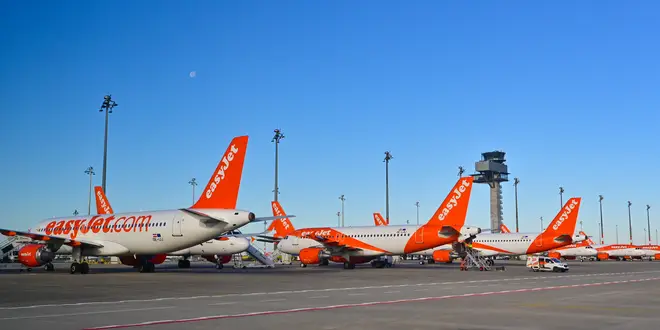
Shelagh Fogarty 1pm - 4pm
17 November 2020, 07:21 | Updated: 17 November 2020, 08:07

easyJet has reported pre-tax losses of £1.27 billion for the year to September 30, marking the first loss in the airline's 25-year history.
The group's pre-tax loss for the year to September 30 comes after passenger numbers halved to 48.1 million as the pandemic crippled the aviation industry.
It warned it expects to fly no more than around 20% of planned services in the first quarter of its year to next September as a relentless second wave of the pandemic batters demand.
Read more: 'Candle of Hope': UK secures millions of Covid vaccines
EasyJet's losses compare with profits of £430 million the previous year.
On an underlying basis, easyJet reported pre-tax losses of £835 million against profits of £427 million the previous year, which was in line with expectations.

Heathrow boss tells LBC of 'devastating blow' caused by Covid
Johan Lundgren, easyJet chief executive, said the group had responded "robustly and decisively" to the crisis and cheered "welcome news" on a possible Covid-19 vaccine.
He said: "While we expect to fly no more than 20% of planned capacity for the first quarter of 2021, maintaining our disciplined approach to cash generative flying over the winter, we retain the flexibility to rapidly ramp up when demand returns.
"We know our customers want to fly with us and underlying demand is strong."
He added the group expected to "bounce back strongly".
Passenger numbers in the year ending September 30 decreased by 50.0% to 48.1 million, compared with 96.1 million during the previous 12 months.
Flight capacity fell by 47.5% during the same period, driven by the grounding of the airline's entire fleet for 11 weeks from March 30.
EasyJet said it has the flexibility to "rapidly ramp up capacity when we see demand return".
The Luton-based carrier saw a 10-fold increase in bookings for Canary Islands flights in the five days after the UK lifted quarantine restrictions on people returning from the Spanish islands on October 25.
It boosted its capacity by 180,000 seats within 24 hours to "harness the demand".
But it was not long before demand for leisure travel took another hit, with a second national lockdown introduced in England on November 5.